You’re reading the free version of The Morning Dispatch. Consider joining as a paid member to get full access to our news, analysis, community comments, and live events.
Happy Wednesday! A recent visitor to the Palazzo Maffei museum in Verona, Italy, saw a photo opportunity and took it, squatting over a chair bedazzled with Swarovski crystals before losing balance, falling backwards, and shattering the work of art.
“It wasn’t such a brilliant thought to sit on an artwork,” the museum’s director, Vanessa Carlon, told the New York Times. True, but then again, it may not have been a brilliant thought to make art that looks like a chair.
Quick Hits: Today’s Top Stories
- The Israel Defense Forces (IDF) continued its precision attacks on Iranian military bases, air defense systems, and missile launchers on Tuesday. The aerial attacks also successfully targeted Islamic Republic personnel, including Ali Shadmani, whom the IDF described as Iran’s senior-most military commander. Iran launched a volley of ballistic missiles at Israeli population centers, causing several minor injuries, but used fewer projectiles than attacks earlier this week, which Israel attributed to its ongoing strikes against the Islamic Republic’s missile launchers. Also on Tuesday, President Donald Trump held a meeting in the White House Situation Room, ahead of which, according to Axios, the president was “seriously considering” a U.S. strike on Iran’s underground nuclear facilities. Earlier in the day, Trump on social media called for Iran’s “UNCONDITIONAL SURRENDER!” and stated that Iranian Supreme Commander Ali Khamenei is an “easy target,” adding, “We are not going to take him out (kill!), at least not for now.”
- The Hamas-run Gaza Health Ministry said Tuesday that Israeli tanks had killed at least 59 Palestinians and injured more than 200 near an aid station in southern Gaza. According to eyewitnesses and first responders, the tanks opened fire on a large crowd early Tuesday. The IDF acknowledged reports of casualties from IDF tanks and said the military “regrets any harm to uninvolved individuals.”
- Russia carried out a massive missile and drone attack on Kyiv overnight Monday, killing at least 10 people—including a 62-year-old U.S. citizen—and injuring 134, Ukrainian officials said on Tuesday. The barrages targeted buildings city-wide, including a nine-story apartment complex. According to Ukrainian President Volodymyr Zelensky, Russian forces launched more than 440 drones and 32 missiles in the aerial assault, which he described as one of the “most horrific attacks” of the war. Meanwhile, a separate Russian attack on the southern Ukrainian port city of Odesa killed two people, local officials said.
- Less than a week after the Trump administration instructed Immigration and Customs Enforcement (ICE) to pause its raids on hotels, farms, restaurants, and aquaculture or meatpacking facilities, the executive branch reversed course, with Homeland Security (DHS) officials telling staff on Monday the exceptions for certain businesses no longer apply. “There will be no safe spaces for industries who harbor violent criminals or purposely try to undermine ICE’s efforts,” DHS spokeswoman Tricia McLaughlin said on Monday. While Trump said last week that his administration’s immigration policy is “taking very good, long time workers away” from certain businesses, the president changed his tone on Sunday, saying that he wants to “expand efforts to detain and deport Illegal Aliens.”
- The European Commission announced plans on Tuesday to completely ban European imports of Russian gas by the end of 2027. In a statement announcing the decision, European Commission President Ursula von der Leyen accused Russia of attempting to use its vast energy supply to “blackmail us.” The proposal would immediately bar European countries from signing any new gas contracts with Russian suppliers, terminate short-term deals by the beginning of 2026, and end all long-term contracts by the beginning of 2028. The only exception is for landlocked countries, including Hungary and Slovakia, which would be allowed to continue short-term contracts until 2027. While sanctions can only be passed with the unanimous support of the 27 EU countries, trade deals—including this proposal—can be passed with a qualified majority of at least 15 countries.
- Bloomberg reported Tuesday that Homeland Security Secretary Kristi Noem in March directed the Federal Emergency Management Agency (FEMA) to create a memo “on how to abolish itself and create a re-branded, radically smaller disaster response organization.” The seven-page memo, titled “Abolishing FEMA,” outlined several proposed reforms, including cutting the long-term housing assistance for disaster survivors, ending new enrollments in the FEMA-administered National Flood Insurance Program, reducing the size of emergency or disaster-relief benefits, and decreasing the number of emergencies that qualify for FEMA relief. “We want to wean off of FEMA and we want to bring it down to the state level,” Trump said last week when hinting at a FEMA restructuring.
- A federal jury in Colorado on Monday found that MyPillow founder and longtime Trump ally Mike Lindell had defamed Eric Coomer—a former employee of Dominion Voting Systems, which produces voting machine hardware and software—ordering Lindell to pay $2.3 million in damages. Following the 2020 election, Lindell circulated unfounded claims that the election was stolen from Trump, calling Coomer—who was then serving as Dominion’s security and product strategy director—“a traitor to the United States.” Lindell has said he intends to appeal the ruling.
It’s Called SCOTUSblog For a Reason

A Quick Trip to Kananaskis
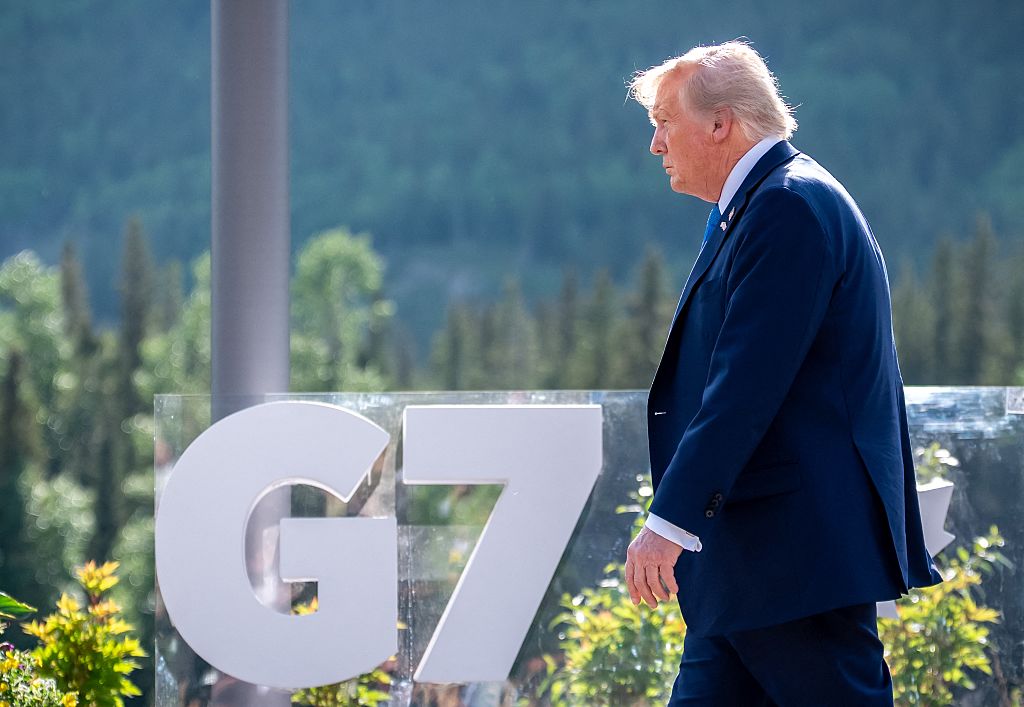
The province of Alberta, Canada, has recently been consumed with political turmoil over its growing independence movement. But this week, as it hosted the Group of Seven (G7) summit, it was the backdrop to an entirely different set of diplomatic fissures: the U.S.’s sharp disagreements with many of its traditional allies on issues like trade, Russia, and the Middle East.
Leaders’ chances to discuss the topics with the American president, however, were cut short, as Donald Trump left the annual meeting of the heads of the world’s largest advanced economies—the U.S., the U.K., France, Germany, Japan, Italy, and Canada, along with the European Union—a day early on Monday night, amid Israel’s ongoing military strikes on Iran.
But there were still important diplomatic developments over the three days of meetings, as the world leaders tried to find consensus on a number of divisive issues. Trump signaled that he was still hesitant about imposing greater sanctions on Russia in order to force it to the negotiating table, breaking with some of the other attendees. He continued his push to make unilateral trade deals with a number of countries, with mixed results. And the assembled countries showed that, at least for now, they’re willing to give Israel breathing room while it continues its air campaign against Iran.
In the past, Trump has had a rocky relationship with the G7. At the last Canadian G7, in 2018, he left early, refused to sign onto the joint communique that traditionally showcases participants’ agreement on key issues, and got into an argument with then-German Chancellor Angela Merkel (in the process generating one of the defining photos of his first term).
This year’s G7 summit got off to a smoother start—sort of. The G7 “is nothing without U.S. leadership,” Canadian Prime Minister Mark Carney said in a joint press conference with Trump before a one-hour closed-door meeting. He would later call the private meeting between them “fantastic.”
But the differences of opinion between the U.S. president and the other G7 members quickly became apparent, particularly on a hot-button issue for Canada and its European allies: Russia. “The G7 used to be the G8. Barack Obama and a person named Trudeau [Canada’s former prime minister] didn’t want to have Russia in,” Trump said of the decision to expel Russia from the organization after its invasion of Crimea in 2014. “And I would say that was a mistake, because I think you wouldn’t have a war right now if you had Russia in.” But he added that probably “too much water’s gone over the dam” for Russia to re-enter the bloc.
The president also poured cold water on the idea that he would agree to the sweeping new sanctions on Russia being proposed in the Senate. “Don’t forget, you know, sanctions cost us a lot of money,” he told reporters Monday. “When I sanction a country that costs the U.S. a lot of money, a tremendous amount of money.” On Tuesday, Reuters reported that the administration had dismantled an inter-agency group focused on creating strategies to pressure Russia, another possible sign that the White House is uninterested in punitive measures to force Moscow to the negotiating table.
However, in Carney’s closing press conference, the prime minister claimed that Trump had agreed to a series of statements on Ukraine with other leaders over dinner the previous night, which were released as part of the “Chair’s Summary” he issued on Tuesday night.
“G7 Leaders expressed support for President Trump’s efforts to achieve a just and lasting peace in Ukraine,” it reads. “They recognized that Ukraine has committed to an unconditional ceasefire, and they agreed that Russia must do the same. G7 Leaders are resolute in exploring all options to maximize pressure on Russia, including financial sanctions.” If Trump did in fact agree with the language, he still is at least in theory open to sanctioning Russia further.
Trump was slightly more conciliatory on the subject of tariffs, a major area of contention between the U.S. and Canada. “Our primary focus will be trade, and trade with Canada. And I’m sure we can work something out,” he said. But Trump conceded that differences between the two sides remained. “I think we have different concepts. I have a tariff concept,” claimed the president. “Mark has a different concept, which is something that some people like,” he said, presumably referring to Carney’s belief in free trade.
Carney’s office later released a statement saying that both countries had agreed to “pursue negotiations towards a deal within the next 30 days.” Trump also announced Monday that he and British Prime Minister Keir Starmer had finalized a trade pact, the framework of which had been agreed upon in May. Besides that, there appears to have been little progress on easing tariffs, with Trump saying that Japan remained “tough” in negotiations and that the EU wasn’t offering a “fair deal yet.”
It seemed like the attendees were teed up for a longer series of debates on Russia and international trade. But on Monday night, the White House announced that Trump would be leaving before the end of the summit, citing the ongoing escalation of conflict between Iran and Israel in the Middle East. “Much was accomplished, but because of what’s going on in the Middle East, President Trump will be leaving tonight after dinner with Heads of State,” White House press secretary Karoline Leavitt wrote on X.
“The oxygen was sucked out of the room by Iran-Israel, and then [by] the fact that he left saying, ‘I’ve got to hurry back because of this war,’” Jim Townsend, an adjunct senior fellow at the Center for a New American Security and the former U.S. deputy assistant secretary of defense for Europe and NATO, told TMD. Townsend also noted that Carney’s stated priorities for the event—trade negotiations and Russia sanctions—were “swamped” by the Middle East conflict.
Ultimately, the only joint statement to come out of the meeting was one that addressed the war between Iran and Israel. G7 summits typically conclude with a joint communique signed by all member countries, addressing the issues discussed between the heads of state. However, in 2018, Trump refused to sign the statement, citing differences of opinion over tariffs.
This time, a consensus statement, albeit a limited one, did emerge from the meeting. On Monday night, a press release from all seven countries showcased guarded support for the continuation of Israeli strikes on Iran. “Iran is the principal source of regional instability and terror. We have been consistently clear that Iran can never have a nuclear weapon,” the statement said. “We urge that the resolution of the Iranian crisis leads to a broader de-escalation of hostilities in the Middle East, including a ceasefire in Gaza.”
The harsh language toward the Islamic Republic, along with the lack of a call for a ceasefire between Israel and Iran, was likely an acknowledgement of Washington’s strong support for Israel. “I think it was a concession to Trump,” said Townsend.
But the statement came after one G7 leader had already gotten himself in hot water with Trump. French President Emmanuel Macron, who on Tuesday said he opposed any attempt at regime change in Iran, told reporters that Trump was headed back to the U.S. in order to negotiate a truce. “They will find a ceasefire, and since they can pressure Israel, things may change,” he said.
Trump denied Macron’s claim, writing on Truth Social that the French president had “no idea why I am now on my way to Washington, but it certainly has nothing to do with a Cease Fire. Much bigger than that.”
The American president claims that he’s hunting much bigger game. “We’re looking for better than a ceasefire,” Trump told reporters on Air Force One late Tuesday night, saying that his goal was a “real end” to the conflict. “A complete give-up, that’s possible,” he added.
Trump has also implied that the U.S. is hard at work behind the scenes as Israel continues to strike Iranian targets. “We now have complete and total control of the skies over Iran,” he wrote on social media Tuesday. Just hours later, he ratcheted up the rhetoric further, calling for Tehran’s “UNCONDITIONAL SURRENDER!”
In Trump’s absence, the G7 wrapped up Tuesday afternoon. Canada and the U.K. both announced a new set of sanctions targeting Russia’s “shadow fleet” of oil smugglers, following their meeting with the late-arriving Ukrainian President Volodymyr Zelensky. “The support will be unwavering until we get a just peace,” said Carney, announcing the sanctions and a new tranche of military aid to Ukraine.
But no matter how much the other members express their agreement on a given issue, the eventual verdict reached by the U.S. will be the most critical. “The U.S. is not going to be a sideline actor with the world’s economy,” Daniel Fried, the former U.S. ambassador to Poland and Weiser Family Distinguished Fellow at the Atlantic Council, told TMD. “It is possible for six of the seven members to have a lot of common ground and recognize it, but the U.S. is never sidelined.”
In his closing press conference, Carney stressed that at this year’s G7, global leaders were confronted with the task of retrofitting established international institutions to a more insecure global environment. “Nostalgia isn’t a strategy,” he said, noting that his country was currently negotiating a new economic and security relationship with the U.S. It may have been the 51st G7, but it seems that leaders understood that it was also one of the first meetings of a new world.
Today’s Must-Read
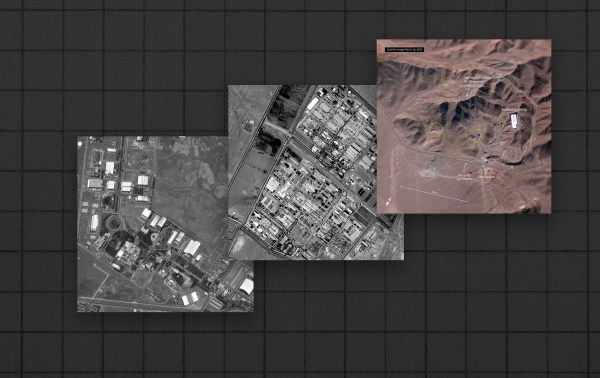
No Breathing Room for Iran
Toeing the Company Line
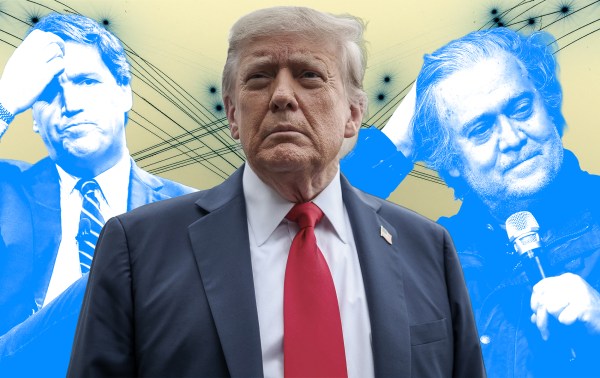


Texas’ App-Store Age Verification Law, Explained
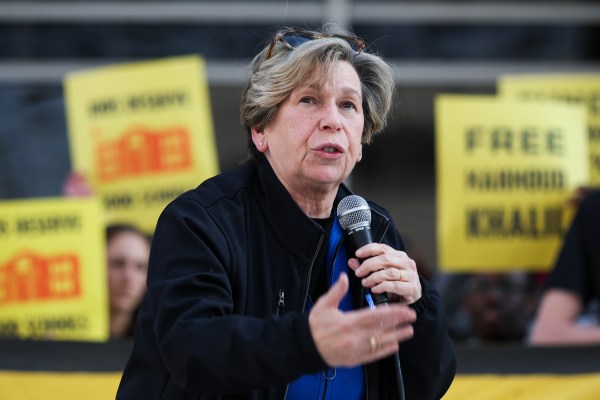
DNC Resignations Highlight Democrats’ Dysfunction

Worth Your Time
- What is a traveler to do when unexpectedly ending up in a war zone? In Tablet, Ani Wilcenski detailed her accidental front-row seat to the confrontation between Israel and Iran. “I realized that I was screwed two days ago at 3 a.m. I’d just drifted off to sleep after a night out with friends in Tel Aviv when my phone and the world outside erupted into a cacophony of disturbing-sounding alarms. … Israel’s Home Front Command made it clear that the days that lay ahead would be nothing short of historic,” she wrote.“It’s unclear when anyone will be able to leave Israel. Ben Gurion Airport is closed for the foreseeable future (for the longest period since 1948). … My best comparison for what Israel feels like right now, at least during the daytime, is the COVID-19 pandemic. … At night, the vibes turn more ominous. As it gets dark, the streets empty, with people returning to their homes in preparation for the inevitable government advisory to stay near a shelter.”
- Zohran Mamdani, a 33-year-old socialist and former rapper, is surging in the polls in New York City’s Democratic mayoral primary following endorsements by Sen. Bernie Sanders and Rep. Alexandria Ocasio-Cortez. In The Free Press, Olivia Reingold examined Mamdani’s chances against former New York Gov. Andrew Cuomo: “As Zohran Mamdani, the 33-year-old candidate for mayor of New York City, took selfies with adoring fans on a recent Sunday in Sunset Park, Brooklyn, a heckler in a MAGA hat began shouting with a megaphone only a few feet away. ‘You’re a socialist,’ the man cried out to the crowd. ‘If you hate America, you should leave.’ Normally, that label—the s-word—might be considered a slur, or at least a political liability. But not to this crowd. ‘Yeah, dude,’ a Mamdani supporter in wire-rimmed glasses scoffed. ‘We are socialists.’ Laughs peeled in from across the park. A terrier with a keffiyeh around its neck began barking with excitement. Volunteers handing out Spanish-language pamphlets craned their necks to catch the commotion. Suddenly, a chant caught on. ‘We are socialists! We are socialists! We are socialists!’”
Presented Without Comment
Reuters: Trump Contradicts His Spy Chief On Iran’s Nuclear Program
U.S. President Donald Trump on Tuesday repudiated Director of National Intelligence Tulsi Gabbard’s assessment that Iran has not been building a nuclear weapon, publicly contradicting his spy chief for the first time during his second term.
…
When told that Gabbard testified to Congress in March that the U.S. intelligence community continued to judge that Tehran was not working on a nuclear warhead, Trump replied, “I don’t care what she said. I think they were very close to having one.”
Also Presented Without Comment
Associated Press: Disgraced Former Sen. Bob Menendez Arrives At Prison To Begin Serving His 11-Year Bribery Sentence
Also Also Presented Without Comment
New York Post: Powerful Trump Aide Who’s In Charge Of Vetting Thousands Of Staffers Still Hasn’t Been Fully Vetted Himself: Sources
Sergio Gor—the director of presidential personnel who recently convinced President Trump to yank an Elon Musk-endorsed nominee for NASA—has yet to submit official paperwork about his own background needed for a permanent security clearance, according to multiple sources.
Gor, 38, is in charge of picking about 4,000 executive-branch staff to implement Trump’s agenda—and he’s done so by poring over old tweets, political donations and remarks to ensure loyalty to the president.
In the Zeitgeist
With the NBA finals tied at two games apiece—in a best-of-seven championship series—the pressure was on for 24-year-old Oklahoma City Thunder star Jalen Williams.
Maybe that pressure was the missing ingredient all along. “I’d be lying if I said I could’ve envisioned doing what I did tonight,” he said after scoring 40 points in Monday’s game against the Indiana Pacers.
Let Us Know
How would you assess Donald Trump’s handling of the G7 summit and the Israel-Iran conflict this week?




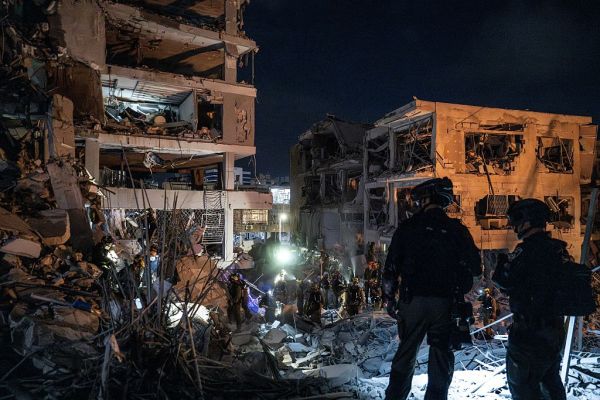

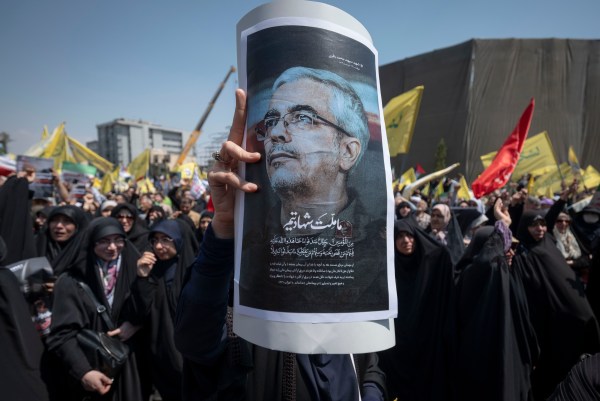

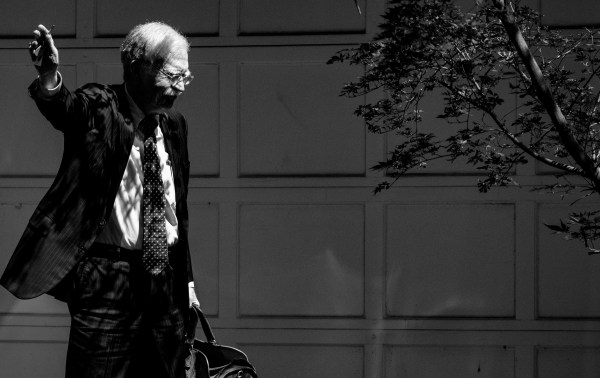



Please note that we at The Dispatch hold ourselves, our work, and our commenters to a higher standard than other places on the internet. We welcome comments that foster genuine debate or discussion—including comments critical of us or our work—but responses that include ad hominem attacks on fellow Dispatch members or are intended to stoke fear and anger may be moderated.
With your membership, you only have the ability to comment on The Morning Dispatch articles. Consider upgrading to join the conversation everywhere.